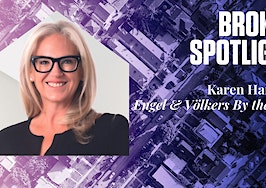No one can predict the future, but you can prepare. Find out what to prepare for and pick up the tools you’ll need at the immersive Virtual Inman Connect on Nov. 1-2, 2023. And don’t miss Inman Connect New York on Jan. 23-25, 2024, where AI, capital, and more will be center stage. Bet big on the roaring future, and join us at Connect.
This article was last updated on Aug. 21, 2023.
“Fake News.” For-profit media. Sponcon. Deep fake video content easily generated by AI. If you grew up hearing the old adage “Believe none of what you hear and only half of what you see,” you might feel that even that level of caution is not enough for today’s online and media environment.
With everyone from influencers to politicians to the evening news offering questionable content, dealing in rumors and innuendo, and blurring the lines between fact and fiction, it’s more important than ever to approach information with a critical eye — and to exercise caution before passing along information to others.
What is media literacy?
The National Association for Media Literacy Education (NAMLE) defines media literacy as “the ability to access, analyze, evaluate, create, and act using all forms of communication … Media literacy empowers people to be critical thinkers and makers, effective communicators, and active citizens.”
In other words, it’s the ability to critically evaluate the information presented to you.
In your private life, a critical analysis of media can keep you from spreading rumors or acting on false information. In your professional life, it can keep you from making decisions or advising clients based on that same false information and help you avoid embarrassing public mistakes and social media posts.
For a real estate agent or broker, those mistakes can create a negative public perception about your competence — one that can have a material effect on your bottom line.
Evaluating sources
The first step in evaluating information is evaluating the source of that information. Here are some things to consider before you act on or pass along something you’ve heard.
Qualifications
It’s always a good idea to examine a content creator’s qualifications and background when reading or viewing their content. Do they have the qualifications to speak with authority on a subject? You might also want to look at original sources and look to other domain experts in the field as a point of comparison.
For real estate information, it’s especially important to ensure that the information you share complies with your state’s laws, regulations, and professional and ethical guidelines. If in doubt, always check in with your broker or a representative from your local association.
Profit motive
The maxim “follow the money” is a very good policy for critically evaluating both the messages and the messengers that you encounter every day. Understanding who is sponsoring everything from your favorite website to your favorite news channel will help you better evaluate the content they’re creating.
Although “free” content is tempting, it requires sponsorship — and that sponsorship can affect the editorial direction of the site or show. Knowing who owns your favorite channel and pays their bills will help you more effectively analyze their messaging.
Ideological motive
We’ve all seen seemingly benign content used to promote ideological points of view — whether political, religious or philosophical. Art, film, music and television have all been used this way in the past, but that was usually in a fictional context. Now, we’re seeing media that should be fact-based delivered with a pronounced ideological slant.
Although this is often fairly clear-cut, it is important to question your consumption of ideologically slanted content. If you know that there is a bias, you should spend some time questioning that bias. It is illogical to assume that inherently biased information is the same as fact-based, objective reporting. Question your assumptions and the information you’re being given. Take in information from multiple sources.
Why does it matter?
Sadly, it seems that today many people feel that objective reality is not knowable or, if it is, it is not meaningful. However, you need to be able to research, understand and communicate honestly and in good faith with leads, clients, colleagues and the public.
The AI of it all
ChatGPT and other AI platforms are making unreliable information even easier to produce and even more difficult to discern. From using AI to consuming content created by it, be sure to always keep in mind the dangers. Read more: The dark side of ChatGPT, deepfakes and real estate
Who are you talking to?
If you are presenting information on a blog, on social media or in any other online forum, you are essentially communicating with the public at large. Even if your intention is only to communicate with a small group of friends or followers, the shareability of online resources means that your thoughts, beliefs and assertions can go far beyond their intended audience.
It is essential that you remember the public nature of the information you’re sharing. In this day and age, even spoken communications can be recorded with cell phones. Ensure that the things you say are true and based in reality before communicating them.
What are you saying?
One way to protect yourself and ensure that you are communicating information truthfully and appropriately is to limit your communication, both online and in person, to factual, demonstrable information. Although you might have your own thoughts or your own media-driven beliefs about why something happened — for political, social or financial reasons, for example — sharing this type of “color commentary” is likely to be ineffective at best, and actionable at worst.
For example, talking about market conditions in terms of your own beliefs about why prices have gone up or down or who’s to blame for the current state of the market could lead you into improper and inappropriate speculation or commentary based on your own unproven hypothesis. Sticking to the facts will help you ensure that you stay on the right side of your ethical and professional obligations.
What is your informational liability?
There are a number of ways that controversial and unprofessional commentary and speculation can result in severe liability to you and your business, potentially bringing about a career-ending incident.
- Breach of fiduciary duty: Public or private commentary that calls into question your ability to act in the best interest of your client based on false or misapplied information.
- Breach of fair housing laws: Public or private commentary that calls into question your adherence to the principles of fair housing, especially derogatory comments about race, religion, sexual orientation or gender identity.
- Breach of ethical obligations: Public or private commentary about “the way business is done” or other elements that call into question the reasons behind your actions. For example, communicating or acting upon personal prejudices or mistaken information to justify misleading or acting against the best interest of a client.
- Commentary that causes material damage: Public or private commentary presented as fact that could arguably damage a market or an individual property’s value, especially when it is based on false or biased information.
Any of these can start with false information received then communicated and perpetuated to clients, colleagues and friends. Remember the old computer warning: Garbage in, garbage out.
Make sure the information you acquire is reliable so that you can feel better about the information you provide.
Christy Murdock is a freelance writer, coach and consultant and the owner of Writing Real Estate. Connect with Writing Real Estate on Instagram and subscribe to the weekly roundup, The Ketchup.












